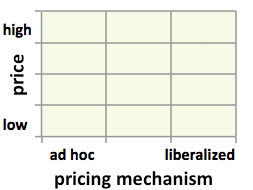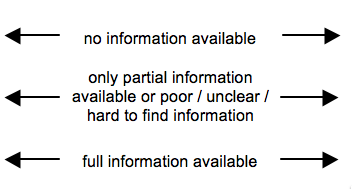Difference between revisions of "Fuel Prices Lao P.D.R."
***** (***** | *****) |
***** (***** | *****) |
||
| Line 7: | Line 7: | ||
In early 2011, fuel prices rose to record levels. In April 2011, the Lao Government therefore considered ways to subsidize diesel in order to keep the inflation low (as prices of foods and goods depend more on diesel than on gasoline prices). According to an internet article (→App. A3), this subsidy might be paid through rising the tax on premium gasoline, leading to an even higher price difference between the two fuel types. | In early 2011, fuel prices rose to record levels. In April 2011, the Lao Government therefore considered ways to subsidize diesel in order to keep the inflation low (as prices of foods and goods depend more on diesel than on gasoline prices). According to an internet article (→App. A3), this subsidy might be paid through rising the tax on premium gasoline, leading to an even higher price difference between the two fuel types. | ||
| − | + | Ministry of Industry and Commerce controls gasoline and diesel prices by region, and also LPG prices, which are adjusted less frequently than gasoline and diesel prices. The ministry reported subsidizing fuel prices in the first half of 2008. Prices were adjusted 18 times in 2009, 14 times in 2010, and 15 times in 2011. In Apr 2011, the ministry reported that government would do its best to keep the diesel price below 10,000 kip (US$1.24) per liter and regular gasoline below 11,000 kip (US$1.37), using such short-term measures as taxing premium gasoline more to cross-subsidize diesel to curb inflation, and has been following this policy. A fuel surcharge was added in Oct 2011 to make up for removal of bridge tolls earlier in 2011. The Lao State Fuel Company, which is government-owned, posts historical gasoline and diesel prices in the Capital and five provinces on its Web site dating back to 2000. | |
| + | |||
| + | (Source: Kojima, Masami. (2013, forthcoming). “Petroleum product pricing and complementary policies:Experience of 65 developing countries since 2009.” Washington DC: World Bank.) | ||
|Fuel Currency=LAK | |Fuel Currency=LAK | ||
|Fuel Price Exchange Rate=7925 | |Fuel Price Exchange Rate=7925 | ||
Revision as of 08:19, 20 February 2013
Part of: GIZ International Fuel Price database
Fuel Pricing Policies
| Local Currency: | LAK |
| Exchange Rate: | 7925
|
| Last Update: | 2011/05/01 |
Fuel prices are regulated by the Price Planning and Marketing Division of the Laos Ministry of Industry and Commerce (→App. A1).
According to several internet articles, prices are changed by the ministry approx. once per month on average. Prices are calculated separately for the five provinces of Lao, reflecting actual transportation costs. (→App. A1 and A2).
In early 2011, fuel prices rose to record levels. In April 2011, the Lao Government therefore considered ways to subsidize diesel in order to keep the inflation low (as prices of foods and goods depend more on diesel than on gasoline prices). According to an internet article (→App. A3), this subsidy might be paid through rising the tax on premium gasoline, leading to an even higher price difference between the two fuel types.
Ministry of Industry and Commerce controls gasoline and diesel prices by region, and also LPG prices, which are adjusted less frequently than gasoline and diesel prices. The ministry reported subsidizing fuel prices in the first half of 2008. Prices were adjusted 18 times in 2009, 14 times in 2010, and 15 times in 2011. In Apr 2011, the ministry reported that government would do its best to keep the diesel price below 10,000 kip (US$1.24) per liter and regular gasoline below 11,000 kip (US$1.37), using such short-term measures as taxing premium gasoline more to cross-subsidize diesel to curb inflation, and has been following this policy. A fuel surcharge was added in Oct 2011 to make up for removal of bridge tolls earlier in 2011. The Lao State Fuel Company, which is government-owned, posts historical gasoline and diesel prices in the Capital and five provinces on its Web site dating back to 2000.
(Source: Kojima, Masami. (2013, forthcoming). “Petroleum product pricing and complementary policies:Experience of 65 developing countries since 2009.” Washington DC: World Bank.)
Fuel Prices and Trends
| Gasoline 95 Octane | Diesel | |
|---|---|---|
| in USD* |
|
|
| in Local Currency |
|
|
* benchmark lines: green=US price; grey=price in Spain; red=price of Crude Oil
Fuel Price Composition
Price composition.
As stated in (see →App. A3), a fuel tax applies for on gasoline, while there is no taxation on Diesel.
Fuel prices differ by the actual transportation costs to the five provinces of Lao. Within a province, prices are to be homogenous (→App. A1 and A3)
No further information found on fuel price composition; hints welcome!
At a Glance
| Regulation-Price-Matrix |
| ||||
 |

|

|

| ||
Sources to the Public
| Type of Information | Web-Link / Source |
|---|---|
| Other Information | http://laovoices.com/lao-government-reduces-fuel-prices/ (A2) |
| Other Information | http://indochinastock.vn/2011/04/consumers-set-for-more-pain-as-fuel-prices-rise-117-108378.htm (A3) |
| Other Information | http://www.moc.gov.la/ |
| Other Information | http://laovoices.com/government-raises-petrol-prices-again/ (A1) |
| Pump prices and margins | http://www.moc.gov.la/ (Information out-dated, as of May 2011) |
Contact
Please find more information on GIZ International Fuel Price Database and http://www.giz.de/fuelprices
The following coordinate was not recognized: {{#geocode: Lao PDR|google }}.



















